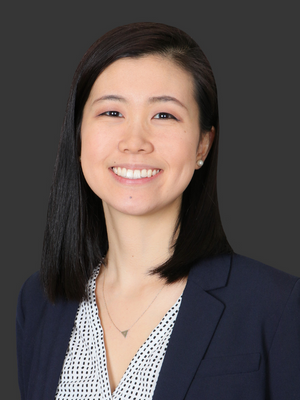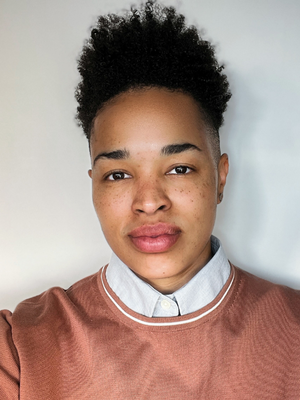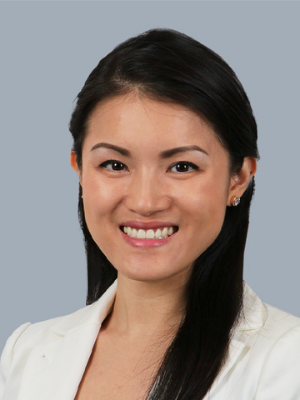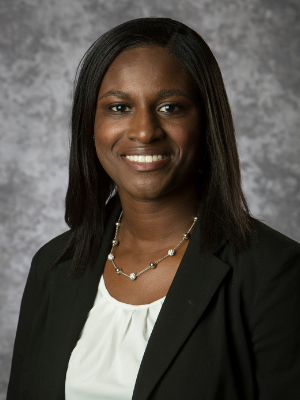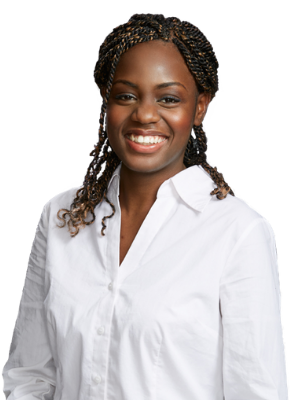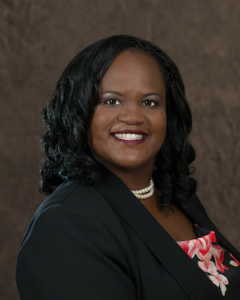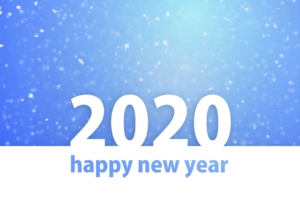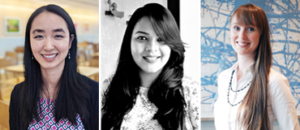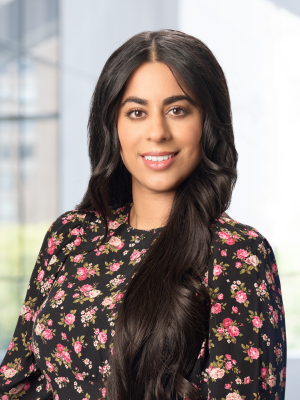 “Over the years, I’ve not always felt confident walking into certain scenarios as a brown, Pakistani, Muslim woman,” says Dania Shahzad. “When I reflect on my previous self, the same things I was nervous about are now what make me feel the most confident and empowered.”
“Over the years, I’ve not always felt confident walking into certain scenarios as a brown, Pakistani, Muslim woman,” says Dania Shahzad. “When I reflect on my previous self, the same things I was nervous about are now what make me feel the most confident and empowered.”
Shahzad speaks to finding inspiration in her family, building confidence in the face of adversity, and how she lives her life steadfast in her conviction that women can do anything.
Finding Her Footing
Shahzad was inspired by her father’s successful career in the financial industry when she chose to major in business during her freshman year of college.
“My dad and I have similar personalities – we are both bold, confident, personable people. I used to go to ‘Take Your Child to Work Day’ and the New York Stock Exchange as a child, and it was so exciting. I was always interested in his world.”
As much as she found her father’s career in the financial services industry compelling, Shahzad recognized that, depending on the role, it could come at the price of long days and working weekends. However, she was determined to find a position and company that encouraged and supported a strong work/life balance while giving her the opportunity to learn, grow, and explore various facets of the financial services industry.
After interning at a variety of firms while in college, she was excited to land at PGIM upon graduating. She says the culture, the wealth of knowledge and breadth of opportunity at PGIM is what’s kept her at the firm.
“It’s a great company for somebody who wants to explore different aspects of the financial services industry,” Shahzad says. She shares that networking opportunities and business resource groups have been particularly enriching for her, as they bring together people from all different backgrounds.
“At PGIM, asking questions, making connections, and taking calculated risks are all encouraged—that helps employees maximize their potential and make the most of their careers.”
Since joining PGIM, Shahzad participated in a two-and-a-half-year rotational program, giving her exposure to several parts of the business and the chance to adapt to new challenges and build her skills. Now, as the business manager for PGIM’s Client Advisory Group, she enjoys handling a variety of responsibilities while leveraging her problem solving and project management skills, such as working on strategic priorities and business reviews, and making connections across the organization, which helps her make progress on the firm’s strategic initiatives and get work done more efficiently. This role has also pushed her to discover her voice, particularly as she is often the most junior person in the room.
Believing She Belongs in the Room
Oftentimes being the most junior person, woman or minority in the room can be intimidating under any circumstances. Shahzad notes that her resilience and courage have grown alongside her belief in the value she brings to the table because of her experience and the encouragement of mentors.
“I’ve grown through advice and mentorship. When entering rooms with senior stakeholders, I remind myself why I belong, why I should be there, and embody that. In the past, I would almost physically make myself disappear, taking more of a passive role in group discussions, but I have gained the confidence to show up more fully.”
One of the leadership positions Shahzad stepped into is as co-lead of the Asian Global Network, an employee affinity group at PGIM. The experience has given her the opportunity to make connections and form peer mentorships across the organization, building her network of support and influence beyond her own group.
“It’s exciting that despite being the most junior of the co-leads, people look to me for recommendations and leadership – and I get to build all these connections. The group has been invaluable to me.”
Shahzad reflects that finding her voice has not only impacted how she sees herself, but how she is viewed by senior leaders.
“It changed how my leadership team sees me. I’m considered someone who can lead and assume bigger responsibilities.”
Shahzad’s personal and professional growth have also influenced how she manages challenging working relationships. “I’m generally a very positive person, but at the same time, I’ve come to recognize and accept that not everyone is going to connect with me, and that’s okay.”
“I’ve learned that you can deliver your opinion, your voice, your vision to a project in a professional way, even when you’re not seeing eye-to-eye with someone. You can still work together productively.”
Embodying the Belief that Women Can do Anything
Shahzad credits her strong female support system as a significant contributor to the confidence she exudes today.
“I believe women are incredibly strong. I have learned so much from the women in my personal and professional life and their experiences. I look at what we’ve accomplished collectively and think, ‘We really can do anything.’”
She hopes to be an example to her two nieces, teaching them how to courageously show up in the world as their authentic selves.
“They are two South Asian females who are going to grow up in the U.S. I want to be able to help them navigate that experience, while also showing them all the powerful things that a woman can do.”
Shahzad notes that part of setting that example is demonstrating her commitment to giving back to the community that has supported her. Serving as the VP-at-Large for the New Jersey Institute of Technology (NJIT) Alumni Board of Directors, her alma mater, she engages with students and actively contributes to the university where she once held a full scholarship.
“Inside, I feel deeply privileged to have such a great life in America. I am passionate about wanting to spend more of my time giving back, and the Alumni Board is one way to do that.” Another important part of Shahzad’s philanthropy ties to her faith – spending time engaged with her local mosque and affiliated community organizations, such as supporting children in need.
Authenticity as an Influencer
Shahzad’s message of empowerment reaches more than the people she works with. In fact, outside of work, Shahzad has gained a following on social media, sharing beauty tips based on her cultural traditions, fashion trends, her adventures around the globe, and more. The success of her platform is evidence of the positive impact that can be achieved by having the courage to stick to your convictions.
“I was bullied as a child for having these beauty rituals, but I persisted because I believed in their benefits and cherished the bonding moments they created with my family. Today, the same hair and skincare secrets and ingredients are becoming popular and normalized in the beauty standards and industry in the U.S. I’m proud of these rituals and passionate about using my platform because I’ve worked hard to create a safe space for women to learn and ask questions while sharing tips from my family and our heritage.”
Shahzad also attributes the success of her platform to the skills she’s attained through her work at PGIM. Applying her project management experience and organizational expertise, Shahzad continually receives positive feedback from brand owners and CEOs about her high level of professionalism.
“I’m really grateful for the experiences I’ve had. I feel empowered that I can have this meaningful career in finance and get to express my more creative side—I can be myself all the time.”
By Jessica Robaire

